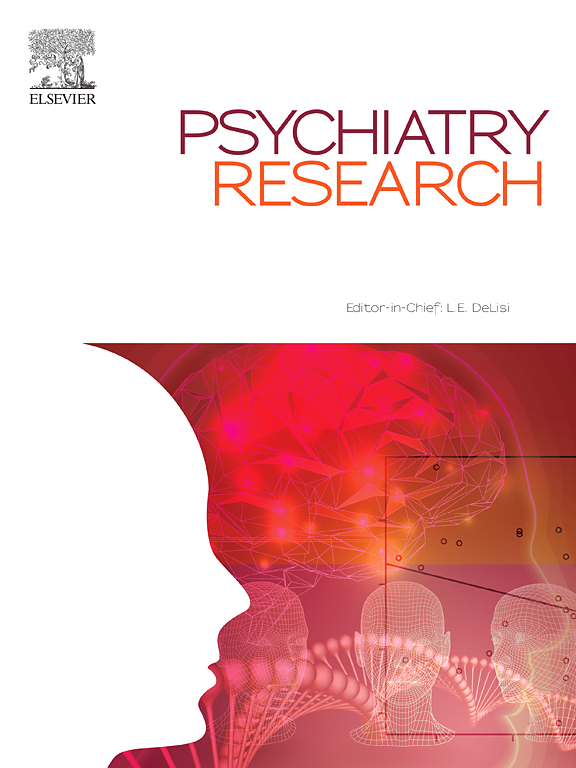Incremental predictive value of genetic risk and functional brain connectivity in determining antipsychotic response in schizophrenia
IF 4.2
2区 医学
Q1 PSYCHIATRY
引用次数: 0
Abstract
We aimed to assess the incremental value of schizophrenia polygenic risk score (PgRS) and resting-state functional brain connectivity (rsFC) when added to clinical data in predicting the six-week response to oral risperidone (Risperdal) in schizophrenia. Fifty-seven, 54, and 43 individuals in a group of never-before-treated first-episode schizophrenia had good quality whole-genome sequencing (10x), rsFC, and both genomic and rsFC data, respectively, at baseline. Symptom severity ratings were obtained at baseline and six-weeks of oral risperidone (Risperdal) treatment. The primary outcome was the percentage change in the Positive and Negative Syndrome Scale Total scores after risperidone (Risperdal) treatment. Clinical, PgRS, and rsFC determinants of treatment response were first evaluated independently. Subsequently, three blocks of hierarchical multiple regression analyses with leave-one-out cross-validation (n = 43), were implemented to study clinical, clinical + PgRS and clinical + PgRS + rsFC determinants of treatment response. While the combined clinical variables did not show a statistically significant prediction of treatment response, adding PgRS (9 % R2 change) and rsFC (26 % R2 change) in hierarchical steps, significantly improved the overall proportion of variance explained in treatment response. This proof-of-concept investigation underscores the incremental benefits offered by genetic and neuroimaging metrics over clinical measures in determining prospectively-ascertained short-term treatment response in first-episode schizophrenia.
遗传风险和大脑功能连接在确定精神分裂症患者抗精神病药物反应方面的增量预测价值
我们旨在评估精神分裂症多基因风险评分(PgRS)和静息态脑功能连通性(rsFC)在临床数据基础上预测精神分裂症患者对口服利培酮(利培酮)六周反应的增量价值。一组从未接受过治疗的首发精神分裂症患者中有57人、54人和43人在基线时分别拥有高质量的全基因组测序(10倍)、rsFC以及基因组和rsFC数据。在基线和口服利培酮(利培酮)治疗六周时对症状严重程度进行评分。主要结果是利培酮(利培酮)治疗后阳性和阴性综合征量表总分的百分比变化。首先对治疗反应的临床、PgRS 和 rsFC 决定因素进行了独立评估。随后,对治疗反应的临床、临床+PgRS和临床+PgRS+rsFC决定因素进行了三组分层多元回归分析,并进行了leave-one-out交叉验证(n = 43)。虽然综合临床变量对治疗反应的预测没有统计学意义,但在分层步骤中加入 PgRS(R2 变化率为 9%)和 rsFC(R2 变化率为 26%),可显著提高治疗反应中可解释变异的总体比例。这项概念验证研究强调了遗传和神经影像指标在确定首次发作精神分裂症的前瞻性短期治疗反应方面比临床指标更有优势。
本文章由计算机程序翻译,如有差异,请以英文原文为准。
求助全文
约1分钟内获得全文
求助全文
来源期刊

Psychiatry Research
医学-精神病学
CiteScore
17.40
自引率
1.80%
发文量
527
审稿时长
57 days
期刊介绍:
Psychiatry Research offers swift publication of comprehensive research reports and reviews within the field of psychiatry.
The scope of the journal encompasses:
Biochemical, physiological, neuroanatomic, genetic, neurocognitive, and psychosocial determinants of psychiatric disorders.
Diagnostic assessments of psychiatric disorders.
Evaluations that pursue hypotheses about the cause or causes of psychiatric diseases.
Evaluations of pharmacologic and non-pharmacologic psychiatric treatments.
Basic neuroscience studies related to animal or neurochemical models for psychiatric disorders.
Methodological advances, such as instrumentation, clinical scales, and assays directly applicable to psychiatric research.
 求助内容:
求助内容: 应助结果提醒方式:
应助结果提醒方式:


